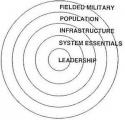Your dillemma is seen throughout social sciences when we try to apply fixed rules, boundaries, and parameters to an open, living system. For instance, in a 2 player min/max game, we assume perfect communication, rational actors, and fair play. In reality, that never happens.
I would suggest looking at Brinksmanship, First Strike games, and Evolutionary Stable Systems (ESS) for better application in the real world.









 anyway it is the Strategy that the republicans are using against President Obama and it is working!!!!!!all the Republicans have to do is make him fail on one or more of his polices and the Republicans will win the elections, they don't have to offer any solutions just make him fail. Much of the game theory used in the paper was done be de Mesquita.
anyway it is the Strategy that the republicans are using against President Obama and it is working!!!!!!all the Republicans have to do is make him fail on one or more of his polices and the Republicans will win the elections, they don't have to offer any solutions just make him fail. Much of the game theory used in the paper was done be de Mesquita.

Bookmarks